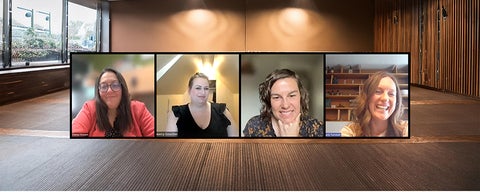Driving Research Impact: How UWaterloo's Centers and Institutes Excel in Knowledge Mobilization
Effective knowledge mobilization is essential for turning research into real-world solutions, and university centers and institutes play a pivotal role in making this happen. By fostering co-creation with end-users, nurturing long-term relationships with key stakeholders, and translating complex ideas into accessible formats, these hubs bridge the gap between academia and application. From informing policy to driving innovation, they ensure that research is not only shared but also applied, amplifying its impact on pressing global challenges.
Knowledge mobilization (KMb) is the practice of ensuring that research addresses real-world problems by connecting findings to the people and organizations that can apply them. Beyond sharing results, it emphasizes collaboration, dialogue, and co-creation to create solutions that benefit society locally and globally.
The University of Waterloo’s Knowledge Mobilization Community of Practice (CoP) connects UW staff whose main role is to support knowledge mobilization across the university’s departments, centres, and institutes. By providing a platform for sharing practices and expertise, the CoP strengthens the university’s ability to ensure research is effectively applied to benefit society.
On September 18, 2024, the CoP hosted a virtual panel featuring four KMb practitioners from various centres and institutions across campus. The panelists presented KMb initiatives in each of their units and discussed essential competencies for successful implementation. The session highlighted the vital role that these centres and institutes play in advancing knowledge mobilization efforts at the University of Waterloo.
Centres and Institutes Co-Create with End-Users
Carly Turnbull,Managing Director of the Centre for Bioengineering and Biotechnology (CBB) emphasized the importance of designing solutions with input from end-users. She showcased the CBB’s Profs Presents seminar series, developed alongside the Grand River Hospital, where researchers presented their work directly to clinicians.
One of the things we really strive for at the Centre is an end-user designed solution. You can’t create an engineering solution, a science solution, without having the input of the people who are actually going to use it.

Centres and Institutes Build Vital Relationships
Nancy Goucher, Knowledge Mobilization Specialist at the Water Institute, highlighted the importance of building trust and respect with researchers. Drawing on her 15 years of experience in water management, she emphasized how her subject matter expertise plays a critical role in fostering collaborative relationships, “This is what helps to build trust with researchers,” she explained.
This past summer, Goucher conducted a researcher check-in process for one of the projects she supports. This involved setting up meetings with all the research teams to understand their progress, challenges and goals.
“Effective knowledge mobilization requires both a deep understanding of the research being conducted and strong connections with the people doing the research,” Goucher explained.
Goucher also highlighted the WaterLeadership certificate program coordinated by the Water Institute, which has equipped hundreds of graduate students with skills in research communication and knowledge mobilization
Centres and Institutes Translate Research Across Disciplines
Emma Vossen, the Knowledge Mobilization and Research Impact Officer at the Games Institute (GI), described the challenge of translating research across diverse disciplines.
Many GI members, particularly those working in Human-Computer Interaction, must simplify their language when speaking with a community outside their research group; they recognize the need to translate their research and knowledge if they want others to interact with it.

Emma Vossen from the Games Institute, Nancy Goucher from the Water Institute, Elanor Waslander from the Climate Institute, and Carly Turnbull from the Centre for Bioengineering & Biotechnology
As such, one of GI’s critical services is transforming complex academic research into easily understandable knowledge products, such as large interdisciplinary project posters that cover the hallways of the GI. These posters are written in simple language and designed to be easily understood by visitors of all backgrounds. PDFs of many of the project posters can be found on the GI website.
Centres and Institutes Connect Research to Policy
Elanor Waslander, Communications Officer from the Climate Institute introduced its policy brief program. Launched in 2022, it is designed to help researchers translate their findings into actionable policy recommendations. Researchers collaborate with the Institute to refine their briefs for clarity and accessibility, particularly for audiences unfamiliar with policy writing.
“The policy briefs that have been published are creating real-world impact,” shared Waslander. “One was shared at the Conference of the Parties on Biodiversity, and another sparked an invitation to present at the Standing Senate Committee on Fisheries and Oceans in Canada."
Challenges and Lessons Learned
Panelists acknowledged key challenges in knowledge mobilization. including time constraints, balancing simplification with accuracy, institutional barriers, and limited resources. Despite these hurdles, they agreed on the necessity of knowledge mobilization to ensure research leads to meaningful, tangible outcomes.
Panelists agreed that the University’s Centers and Institutes, with their strong ties to faculty members, are ideally situated to provide the capacity needed to develop and implement knowledge mobilization strategies. Their success is dependent on the specialized knowledge, networks, and skills that they bring to the research process.
Now more than ever, it is critical that we support the development and execution of knowledge mobilization procedures, programs, and solutions if we want our research to contribute to "equitable and sustainable solutions for the future of humanity and our planet" as set out in the Waterloo at 100 strategic vision
Research shouldn’t just live in a document or publication. It needs to actively improve the lives of people, ecosystems, and the world.
More Information
The CoP continues to foster collaboration by meeting bi-monthly to share practices, discuss challenges, and inspire effective knowledge mobilization. Those interested in joining can reach out to Nadine Quehl for more information.